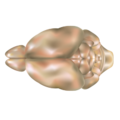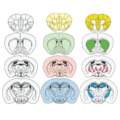Mouse brain

The mouse brain refers to the brain of Mus musculus. Various brain atlases exist.
For reasons of reproducibility, genetically characterized, stable strains like C57BL/6 were chosen to produce high-resolution images and databases. Well known online resources include:
- Allen Brain Atlas
- Mouse Brain Library
- High resolution mouse brain atlas
- BrainMaps
Despite superficial differences, especially in size and weight, the mouse brain and its function can serve as a powerful animal model for study of human brain diseases or mental disorders (see e.g. Reeler, Chakragati mouse). This is because the genes responsible for building and operating both mouse and human brain are 90% identical. Transgenic mouse lines also allow neuroscientists to specifically target the labeling of certain cell types to probe the neural basis of fundamental processes.
Anatomy
The cerebral cortex of a mouse has around 8–14 million neurons while in those humans there are more than 10–15 billion. The olfactory bulb volume takes about 2% of the mouse brain by volume in contrast to about 0.01% of the human brain.
-
 Mouse brain, dorsal view
Mouse brain, dorsal view -
 Mouse brain, lateral view
Mouse brain, lateral view -
 Mouse brain slices
Mouse brain slices -
 Mouse cingulate cortex neurons
Mouse cingulate cortex neurons -
![A biophysically realistic model of the mouse primary motor cortex microcircuit representing a cylindrical volume of 300 μm diameter: 3D visualization, connectivity, dimensions, and neuronal densities, classes, and morphologies[11]](//upload.wikimedia.org/wikipedia/commons/thumb/5/56/M1_microcircuit_model.jpg/120px-M1_microcircuit_model.jpg) A biophysically realistic model of the mouse primary motor cortex microcircuit representing a cylindrical volume of 300 μm diameter: 3D visualization, connectivity, dimensions, and neuronal densities, classes, and morphologies
A biophysically realistic model of the mouse primary motor cortex microcircuit representing a cylindrical volume of 300 μm diameter: 3D visualization, connectivity, dimensions, and neuronal densities, classes, and morphologies




![A biophysically realistic model of the mouse primary motor cortex microcircuit representing a cylindrical volume of 300 μm diameter: 3D visualization, connectivity, dimensions, and neuronal densities, classes, and morphologies[11]](http://upload.wikimedia.org/wikipedia/commons/thumb/5/56/M1_microcircuit_model.jpg/120px-M1_microcircuit_model.jpg)